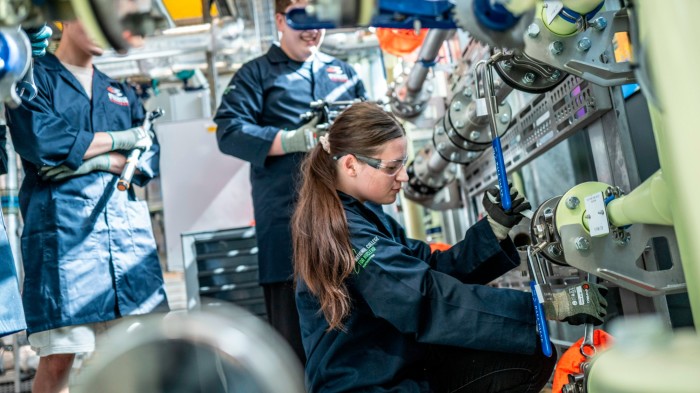Unlock the Editor’s Digest for free
Roula Khalaf, Editor of the FT, selects her favourite stories in this weekly newsletter.
Sir Keir Starmer will invest £2bn over four years to cut energy prices by up to a quarter for thousands of businesses, as part of his long-awaited industrial strategy.
A new “British Industrial Competitiveness Scheme” would reduce electricity costs for more than 7,000 energy-intensive businesses in sectors including automotive, aerospace and chemicals, the government said.
Details of the businesses eligible for the scheme — which will exempt companies from paying various green levies and will come into force in 2027 — will be determined after a consultation.
The move is likely to anger those in the retail and leisure sectors who complain about high energy bills as well as the rise in their staffing costs following the government’s increase to National Insurance contributions in April.
The government will also launch a system to streamline access to the grid for industrial companies, the Connections Accelerator Service, aiming to use new powers in its Planning and Infrastructure Bill to reserve grid capacity for strategically important projects.
The unveiling of the industrial strategy on Monday will mark Starmer’s attempt to set a clear 10-year plan for boosting the British economy across its industrial heartlands and regions suffering from economic stagnation.
Nigel Farage’s populist Reform UK party has been pushing for a more robust industrial strategy and greater investment in skills and job opportunities in deprived regions, creating fresh urgency at the top of the Labour party.
Reform is doing particularly well with voters in areas of Britain with high levels of unemployment and child poverty.
The industrial strategy will focus on eight key sectors: advanced manufacturing, clean energy, creative industries, defence, digital and technologies, financial services, life sciences, and professional and business services.
The new energy schemes will be funded through reforms to a range of environmental and green levies, including the Emissions Trading Scheme and contracts for difference, which support the development of renewables like offshore wind.
However, Adam Bell, director of policy at consultancy Stonehaven, said it was still unclear how the government would pay for the policies, adding “there’s a bunch of missing money”.
As part of its energy reforms, the government will extend its “British Industry Supercharger” scheme, which offers a 100 per cent exemption from renewable energy levy costs and a 60 per cent reduction in network charges.
Under the current scheme, UK steelmakers are paying £66/MWh compared with the equivalent German prices of £50/MWh and French prices of £43/MWh, according to industry lobby group Make UK.
To narrow the gap, the government will make the network charge reduction more generous, increasing it from 60 per cent to 90 per cent, helping around 500 eligible businesses in sectors like steel, ceramics and glass.
The government is also planning to make the UK’s regions more attractive to investors by simplifying a myriad of local tax breaks.
The Department for Business and Trade is expected to announce it will bring freeports, investment zones and enterprise zones under the umbrella of “Industrial Strategy Zones”, according to two people familiar with the situation.
The shake-up is designed to eliminate the confusion between the three special economic zones, which even those involved admit are almost identical.
They typically offer time-limited business rates relief and enhanced capital allowances on plant and machinery, simplified import and export procedures but have slight differences in terms of the seed capital funding they can access.
The new Industrial Strategy Zones are expected to divert further power to regional mayors, particularly on planning.
Ministers said over the weekend that the industrial strategy would include investment of £275mn to create new education programmes and apprenticeships to train up thousands more skilled UK workers by 2029, especially in defence and engineering.
The creative industries will receive a £380mn boost, including £150mn for mayors in Liverpool, Manchester, the West Midlands and West Yorkshire to support creative businesses in their regions.






